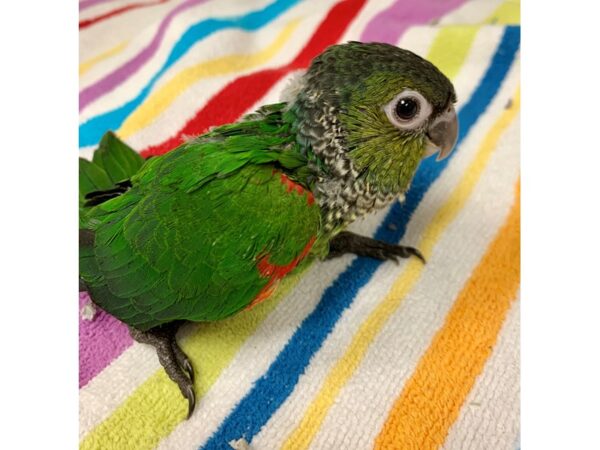Black Capped Conure
Owning a Black-capped Conure as a pet can be a rewarding experience. These charming birds are known for their playful personalities, intelligence, and striking appearance. Here's some information to consider:
Basic Information:
- Species: The Black-capped Conure (Pyrrhura rupicola), also known as the Rock Conure or Black-capped Parakeet, is a small parrot native to South America, particularly in regions such as Brazil, Bolivia, and Argentina.
- Appearance: Black-capped Conures have predominantly green plumage with a black cap on their heads, giving them their name. They also typically have red patches on their wings and tails, as well as blue flight feathers.
- Size: They are relatively small parrots, typically measuring around 10 inches (25 cm) in length.
- Lifespan: With proper care, Black-capped Conures can live for 15 to 30 years or even longer in captivity.
Housing:
- Cage: Provide a spacious cage with plenty of room for your Black-capped Conure to move around, stretch its wings, and play. The cage should be wider than it is tall, with horizontal bars for climbing. A minimum cage size is typically 24 inches by 24 inches by 24 inches.
- Perches and Toys: Offer various perches of different diameters to exercise their feet, and provide plenty of toys to keep them mentally stimulated. Conures are intelligent birds and require mental stimulation to prevent boredom.
Diet:
- Pellets: A high-quality pellet diet formulated for small to medium-sized parrots should form the basis of their diet, providing balanced nutrition.
- Fresh Fruits and Vegetables: Offer a variety of fresh fruits and vegetables daily, such as apples, bananas, grapes, carrots, and leafy greens. Avoid avocados, chocolate, caffeine, and high-fat or salty foods, as these can be harmful to birds.
- Seeds and Nuts: Offer seeds and nuts as occasional treats, as they are high in fat and should be given in moderation.
- Water: Fresh, clean water should be available at all times.
Socialization and Interaction:
- Bonding: Black-capped Conures are social birds and can form strong bonds with their human caregivers. Spend time interacting with your bird daily through gentle handling, talking, and playing.
- Training: They are intelligent birds and can be trained to do tricks and mimic sounds. Positive reinforcement training methods work well with them.
Health Care:
- Veterinary Care: Schedule regular check-ups with an avian veterinarian to ensure your Black-capped Conure remains healthy. Annual check-ups are recommended.
- Grooming: Trim their nails and wings as needed. Some owners also opt for regular grooming sessions to help maintain their bird's plumage.
Environmental Enrichment:
- Out-of-Cage Time: Allow supervised out-of-cage time daily to explore and exercise.
- Environmental Enrichment: Provide foraging opportunities, such as hiding treats in toys or foraging devices, to keep your Black-capped Conure mentally stimulated.
Noise Level:
Black-capped Conures, like other conure species, can be vocal. They may chirp, squawk, or make other sounds throughout the day. However, they are not as loud as some larger parrot species.
 Adopted
Adopted